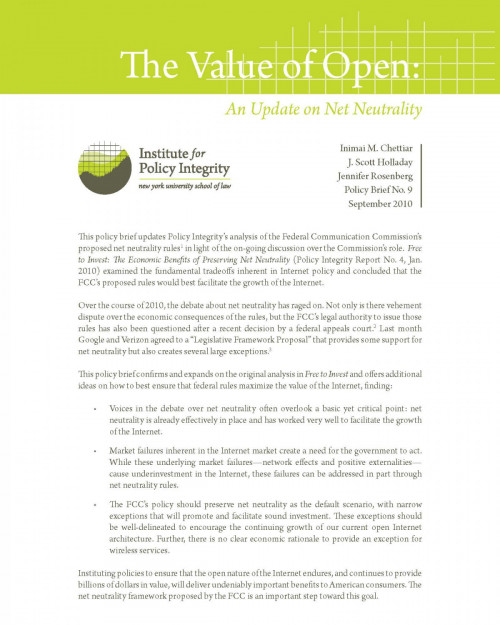-
Response to the European Commission on Net Neutrality
Today, Policy Integrity submitted comments on net neutrality to the European Commission, Directorate-General for Information Society and Media, (EC) in response to the EC’s “Public Consultation on the Open Internet and Net Neutrality in Europe.”
-
_110_86_90.jpg)
Climate Change and Future Generations
Efforts to reduce greenhouse gases and control climate change implicate a wide range of social, moral, economic, and political issues, none of them simple or clear. But when regulators evaluate the desirability of climate change mitigation through cost-benefit analysis, one factor typically determines whether mitigation is justified: the discount rate or the rate at which future benefits are converted to their present value.
This working paper evaluates the four principal justifications for intergenerational discounting, which often are conflated in the literature. It shows that none of these justifications supports the prevalent approach of discounting benefits to future generations at the rate of return in financial markets and, more generally, that discounting cannot substitute for a moral theory setting forth our obligations to future generations.
-

The Value of Open
An Update on Net Neutrality
An open Internet allows anyone with an idea and a domain name to add content to the web for all to use. It’s a system that most believe works very well, generating billions in economic benefits for the American public every year. This policy brief analyzes the economic uncertainties of weakening our current, open Internet and sees potential trouble ahead if it is not preserved.
-
Memo to the Department of Justice on Prison Safety
The Prison Rape Elimination Act, passed in 2003, was supposed to protect individuals in prison from sexual assault. But seven years after its enactment, it has yet to be implemented.
-
Public comment on EPA’s new rules for hazardous air
The exhaust from the boilers of industrial and commercial buildings, and incinerators can be particularly poisonous; consistent inhalation can lead to heart and lung disease and cancer.
-
Mayor Bloomberg Signs Heating Oil Bill into Law
This afternoon, Policy Integrity legal fellow, Jason Schwartz spoke at the bill signing ceremony for Introduction 194|Text|&Search=194, a New York City Council act that will reduce air pollution.
-
OMB considering reviewing rulemaking petitions for under-regulation
Earlier this summer, Policy Integrity submitted comments on OIRA’s annual report to Congress.
-
Economists write FCC to rebut statement from 74 Members of Congress
On May 24th, 2010, 74 Democratic members of the House of Representatives sent a letter to the Federal Communications Commission requesting the halt of net neutrality regulations.
-
Policy Integrity requests permission to participate as amicus curiae on tailpipe standards cases
Due today were filings to participate as amicus curiae on one of three court cases seeking judicial review of the Environmental Protection Agency’s CAFE standards.
-
Policy Integrity submits comments to OIRA’s 2010 report to Congress
Each year, the Office of Information and Regulatory Affairs (OIRA) reports to Congress on the costs and benefit of federal regulations.
